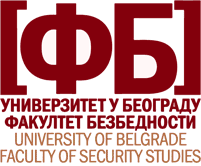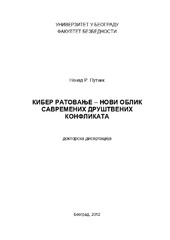Cyber warfare - a new form of contemporary socia conflicts
Кибер ратовање - нови облик савремених друштвених конфликата
| dc.contributor.advisor | Milašinović, Radomir | |
| dc.contributor.other | Džigurski, Ozren | |
| dc.contributor.other | Simić, Dragan R. | |
| dc.creator | Putnik, Nenad R. | |
| dc.date.accessioned | 2020-01-08T16:53:55Z | |
| dc.date.available | 2020-01-08T16:53:55Z | |
| dc.date.issued | 2012 | |
| dc.identifier.uri | http://eteze.bg.ac.rs/application/showtheses?thesesId=565 | |
| dc.identifier.uri | https://fedorabg.bg.ac.rs/fedora/get/o:6723/bdef:Content/download | |
| dc.identifier.uri | http://vbs.rs/scripts/cobiss?command=DISPLAY&base=70036&RID=512199093 | |
| dc.identifier.uri | http://nardus.mpn.gov.rs/123456789/2787 | |
| dc.identifier.uri | https://rhinosec.fb.bg.ac.rs/handle/123456789/429 | |
| dc.description.abstract | The creation of cyberspace represented a seminal turning point in the sphere of military activities, as well as in the understanding of corporate, national, regional and global security. The new “space” offered numerous possibilities for carrying out special propaganda operations and computer network based attacks on the enemy’s information systems. In English-speaking countries a term “cyber warfare” (kiber ratovanje) has been coined to describe this new form of confrontation in the virtual space. Attacks in a virtual space though they seem to be insignificant, can cause numerous casualties and material devastations in real, physical world. That is why cyber warfare has a central place in the field of interest of military, information, legal and security theorists and experts. At the end of the 21st century, the problem of conflicting in a virtual space has become one of the important topics of discussion in scientific and professional circles in all countries depending on information-communication technologies. Still, previous researches treated that phenomenon fragmentarily, and that resulted in the inability of creating a firm theoretical framework and clearly defined terminology. Bearing in mind that scientific literature has not sufficiently and coherently explored the phenomenon of cyber warfare, a scientific aim of this research has been a scientific explanation of cyber warfare phenomenon. The research of a phenomenon this complex necessarily imposes a multi-methodical approach and requires a complementary analysis of available and newly acquired data sources. We are talking about dominantly qualitative research approach, and insufficient theoretical basis brought about mostly exploratory nature of established research requirements. A scientific explanation of this current social phenomenon meant, thus, systematization of previous knowledge about cyber warfare, which assumed recognition, description and a thorough classification of different forms of conflicts in cyberspace. The results of the research show that cyber warfare is a comparatively new and unique form of social conflict which takes place in a specific environment, by using specific means, which has specific characteristics and principles. It can be a war without casualties, but it does not have to be like that. This form of conflict can be waged on its own, or can be a support to a conventional, kinetic conflict. The activity of cyber warfare does not have to be limited by a military discourse. Principles of cyber warfare are present IV in various different contexts, though a range of motivations and practices can vary to a great extent. Protagonists of cyber warfare use very well thought-out tactics and strategies in order to precisely determine targets of the attack and achieve their aims in a way that is similar to military methods. Destructive actions of various individuals and groups in cyberspace can have similar impulses, show similar understanding of strategic advantages which enable attack methods based on information technologies, and be revenge to those whose lives depend to a great extent on the use of complex information and communication systems. Cyber warfare not only questions certain conventional assumptions about the nature of social conflicts, but at the same time illustrates some of hidden possibilities and paradoxical potentials (social fusion and fission) of globally connected technologies. It, also, raises numerous questions related to the morality of offensive cyber warfare and adequacy of the existing multilateral regulations and conventions into which these new modalities should be adjusted. We believe that this, holistically based, analysis helps clarifying conceptual and terminological corpus of this specific field. Devoid of its military roots, the vocabulary and principles of cyber warfare can have a great analytic applicability. Different aspects of cyber conflicts, which have been analyzed in this paper, can be assigned to general theoretical principles and established characteristics of the phenomenon we have defined by the concept “cyber warfare.” On the practical level, the results of this research can contribute to a better understanding of this subject, which is of a great significance to developing strategies of prevention, suppression and controlling security risks in cyberspace, both on a corporate and national level. A fast entering of “information conflicts” into civil and corporate frameworks presents a serious problem to managers responsible for protection and security of information infrastructure. Managerial structures on a corporate-economy level have to be aware of how wide a spectrum of potential attacks is, including modern espionage, organized crime, perceptive battles, as well as hacker attacks, and attacks sponsored by states or business rivals. The concept of managing security risks in cyberspace from the aspect of national security, though, requires coordination of national legislation with the existing international standards. From the point of view of regional and global security, a particularly important problem is the lack of general accord on international agreements which would clarify a legal status of states and non-state actors in cyber conflicts. From the V said reasons, this paper has called attention to the need of equalization normative approaches with the aim of adopting acceptable legal definitions of basic concepts in the field of cyber warfare. Apart from that, propositions of possible directions of the development of international law of war have been proposed in order to develop more adequate mechanism of confronting and protection against cyber conflicts. | en |
| dc.language | sr | |
| dc.publisher | Универзитет у Београду, Факултет безбедности | |
| dc.rights | openAccess | |
| dc.subject | social conflicts | en |
| dc.subject | war conflicts | en |
| dc.subject | modern warfare | en |
| dc.subject | cyber warfare | en |
| dc.subject | aspects of cyber warfare | en |
| dc.subject | critical infrastructures | en |
| dc.subject | national security | en |
| dc.subject | protection of information systems | en |
| dc.subject | друштвени конфликти | sr |
| dc.subject | ратни сукоби | sr |
| dc.subject | савремено ратовање | sr |
| dc.subject | кибер ратовање | sr |
| dc.subject | аспекти кибер ратовања | sr |
| dc.subject | критичне инфраструктуре | sr |
| dc.subject | национална безбедност | sr |
| dc.subject | заштита информационих система | sr |
| dc.title | Cyber warfare - a new form of contemporary socia conflicts | en |
| dc.title | Кибер ратовање - нови облик савремених друштвених конфликата | sr |
| dc.type | doctoralThesis | |
| dc.rights.license | APR | |
| dcterms.abstract | Милашиновић, Радомир; Джигурски, Озрен; Симић, Драган Р.; Путник, Ненад Р.; Kiber ratovanje - novi oblik savremenih društvenih konflikata; | |
| dc.identifier.fulltext | https://rhinosec.fb.bg.ac.rs/bitstream/id/271/426.pdf | |
| dc.identifier.rcub | https://hdl.handle.net/21.15107/rcub_nardus_2787 | |
| dc.type.version | publishedVersion |

